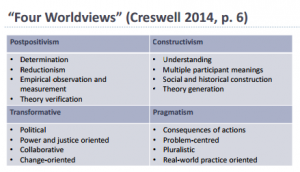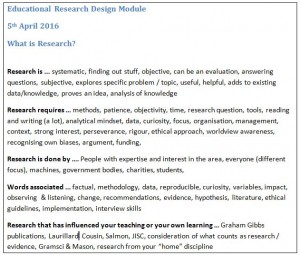The following is a reflection on Week 1 of the Educational Research Design module using Gibbs Reflective Cycle.

Description
Today was our first day on Research Educational Methods and even though I was familiar with some of the terminology there were definitely some new elements e.g. Creswell’s Four Worldviews.

Furthermore, my brief encounter with research stems from a social research perspective which relates to “the significance of assumptions about the nature of the world and about how knowledge about it should be produced” (Bryman, 2012, p.4). As a group we were asked to define research and the following encapsulates the class’s perspective.

We discussed ontology and epistemology, academic writing and theoretical perspectives. Ontology is about what is true and epistemology is about the methods of figuring out those truths.
Feelings
Two weeks ago when we were asked to think about our research topic idea and submit it on 4th April 2016 with a review of two research papers I was very daunted and even panic striken as to what direction I should take. However, I realise that this exercise was crucial in order to focus our thinking and ideas.
While this module is research heavy I can understand why this is important due the academic influence and theory underpinning our research. After completing the activities, I felt that I came away from class with a more predefined idea of what I am going to do for my research and interestingly different to what I submitted.
Evaluation
Carrying out the activity on developing your research topic was very beneficial. Breaking into groups and discussing our research topics with each other was invaluable. The activity asked us not only to look at the main benefit of doing this work but also the challenges. The overall consensus from my group was that each of us were perhaps undertaking a project that was too broad and that refocusing on one element may be more beneficial. This was even more evident when we were furnished with a list of 7 MSc projects and the research titles were very specific.
I also believe that today highlighted the reality of what we are about to embark on and I hope will enable me to really refocus on my ideas over the coming weeks. A very informative session with some good tips on further reading materials and resources.
Analysis
One concept I had never considered before is the interchangeable use of different terminology and I need to be aware of this in my own paper. Referencing and explaining from the perspective of the relevant author is required. It was inevitable that the importance of the research question would be highlighted and I believe this underpins the whole research project. Everything we write has to relate in some shape or form to answering the research question. If it doesn’t we should evaluate its existence in the journal.
As highlighted today trying to find an area where a gap exits would be an ideal opportunity for research and this forced me to reconsider my idea. For the past two weeks I was vacillating between two ideas in particular: redesigning an existing face-to-face course to online/blended or serious games/simulations. However, redesigning a course is a big undertaking and is it really adding to existing research? The following was my initial idea submission:
Research Topic Idea
The research topic I propose relates to the transformation of an existing face to face course to online/blended for adult learners. The module I am considering is Career Planning which is currently delivered over a one week full time period (31.25 hours of class delivery) on all courses delivered by Cork Training Centre (under the remit of Cork ETB). Existing research implies that adult learning theory and eLearning theory share parallel principles (Olka, 2006). The flexibility, collaboration and accommodation of different learning styles imply that eLearning may be advantageous to the adult learner.
It has been noted that “adult learners differ from younger learners in preferring more say in what they learn and in doing their learning at their own pace” (NUI Galway, 2013, p. 174). Therefore, gathering data from learners who have completed the face to face module will inform the design of the online/blended course. Furthermore, carrying out a comparative study on student perceptions is considered. While this may in the long term be cost effective there is scope in improving the existing module. As adult learners are self-directed and autonomous adopting a more reflective approach with the use of technologies may enhance the learning experience, for example, reflections, coaching, collaboration and simulations.
References:
NUI Galway (2013). Course Design. Galway: NUI Galway.
Olka, K. (2007). Technical Communicators as Teachers: Creating E-Learning that Matters. Masthead, 47(4).
However, after class today and talking with my peers I am reconsidering serious games/simulations in adult education. There is ample literature on this subject but is more related to children and adolescents so may identify a gap. My question would revolve around the effectiveness of serious games for adult learners in the adult education and training sector. My title would be something like Seriously: adult learners and gaming in education? I am also hoping that it will inform current instruction methods for adult learners. The main challenge I face with this is creating the actual artefact. However, I have recently come across ITyStudio which is the first authoring tool for serious games and simulations. It is expensive to buy but they do provide student discounts.
We were asked in class to create a short 50 word pitch on our research project ideas. I’ve created mine after class using Tellagami which I have also reviewed in Tech Reviews.
Action Plan
To redefine my research topic further and try and finalise my research question. Once I have this achieved I will then be able to focus my time on my literature review which will be the most time consuming element. As noted on the notes today writing itself takes time because you have to read, research, think, compose and revise. I must also research ITyStudio and alternative resources to create my artefact.
Conclusion
This module will facilitate the development of our research topic and proposal with an academic and theoretical foundation. Furthermore, the weekly activities will enable us to redefine our area of research. The activity today aided me in reanalysing my whole research idea. Learning about the research methods from an educational perspective is central to the development of our project next year. Once the question has been designed then everything else has to revolve around it i.e. literature review, methods etc.
References:
Bryman, A. (2012). Social research methods. Oxford University Press.
Creswell, J. W. (2014). A concise introduction to mixed methods research. Sage Publications.